BROADWAY NIGHT at One Thousand Nights And One Day
April 20, 2018
See what people are saying about One Thousand Nights And One Day – now playing at ART on 53rd and tenth. To book tickets visit http://www.prospecttheater.org and use code FACE to save!
It’s always important to have an audience in front of you as an actor. So much of theater is about reacting. Now you can see how the company, creatives -and community have reacted to the show!
Click the links below to check out some fantastic interviews with Great Comet creator, Dave Malloy, aa he gets the reactions of creatives and community members alike, post show.
https://www.youtube.com/watch?v=ulv8sTARsFQhttps://www.youtube.com/watch?v=unoEIF-maxQhttps://www.youtube.com/watch?v=t7XLdexVpvIhttps://www.youtube.com/watch?v=DkqchOfxTUshttps://www.youtube.com/watch?v=W4HBOvjZpDE&t=37s
TAKE A TEN with Jen Anaya
March 30, 2018
TAKE A TEN!
One Thousand Nights and One Day Actor, JEN ANAYA, answers 5 big questions and 5 little ones while on break!
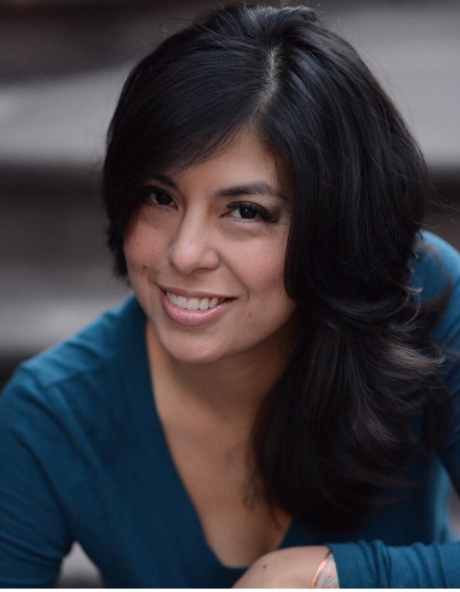
1) Who or what inspired you to become a performer or enter into Theatre Arts?
Hmm. I don’t know that there was one person or thing. My parents played guitar and sang in church when I was growing up, so I was singing before I could speak. Playing a lamb in the school Christmas play was pretty momentous, it made me realize that on stage, one could be anything and people would listen, you could make them laugh and cry. Moving people seemed a worthy and engaging pursuit. My brother and I would write plays and songs and perform them with our marionettes. In high school I had an incredible Music Theater director who took a group of us to see the tour of The King and I in Tempe and she told me that if I wanted to, I could be a performer. That permission was all I needed.
2) Why is Theatre important to you?
Because it’s so POWERFUL!!! Nothing has the power to move the human spirit like theatre. Storytelling is powerful. The stories we tell matter. The way in which we tell them and the people that get to tell them matter so much. I just saw Folk Wandering in the very theater our show will be in. It was GLORIOUS! I sat there and sobbed for pretty much the whole thing. Theatre has the ability to change our minds, to inspire empathy, unlock things inside of us. I once got to play a young woman whose mother, father and lover were all killed within minutes of each other. She sings a song as she holds her dead mother in her arms. After a show, an audience member came up to me and told me through tears that her mother had passed a few months before and she had found herself completely unable to cry since it had happened and had no idea why. She said seeing that moment broke something open in her and she was so relieved and grateful that her grieving could begin. That will always stay with me.
3) This show is so relevant to current events- what do you hope audiences take away from it?
That it’s all a story! That we have the power to create our stories, to change them!
I really hope that people walk away examining their perspectives of the world around them. I’ve long been fascinated by the Toltec concept of the Dream of the World, the collective beliefs we hold as a human race that get passed down from generation to generation and how powerful those stories are.This story, this show is an invitation for people to really sift through and examine those beliefs that dictate how we navigate through the world and decide if they’re helping or hurting. There is a shift happening in our society led by people who don’t believe the old stories anymore. It’s super exciting and inspiring and the more people continue to look inward, the faster the shift will occur and the better off we’ll all be.
4) Who would you most like to work with?
Oof. That is a heck of a question. Right now, I’m beyond ecstatic to be working with this company. I want to work with every single one of these humans as much as possible. Outside of that, people who really love collaboration, free exploration and do heart centered work in a heart centered way.
There’s a wonderful line from a wonderful musical called Found, it says “I wanna do something that I love and do it with people that I love.”
When it comes right down to it, the dream is to work with my friends. I’ve gotten to work with Marisa Michelson a lot in the last few years starting with Tamar of The River and then with her group Constellation Chor. Her work brought me back to New York.
There are so many ridiculously talented playwrights, composers and directors that I am lucky to be around and I really look forward to seeing their work get produced and would so love to go on that ride with them. I’m super moved by the work of Troy Anthony, Jillian Walker, Nic Grelli, Riley Thomas, Ty Defoe, Tidtaya Sinutoke, Keelay Gipson, Forrest Malloy, EllaRose Chary, Brandon James Gwinn, Matt Frey, Melisa Tien, Avi Amon. The list is so long. It’s a gift to know so many incredible artists.
5) What is coming up next for you?
I’m looking forward to going back to Friday mornings with Constellation Choir. The group has been the cornerstone of my artistic life in the last two years and I’ve missed it. I’m really excited to be a part of the upcoming musical Hatuey: A Memory Of Fire. It’ll have a workshop in late May and a run in September. And this summer I’ll be writing, working on a solo show I’ve been writing called Love: A How Not To Guide.
— 5 till places!—
6) Favorite album in high school?
For my 14th bday I asked my parents for the Time Life collection of Rock and Roll from 1954-1962. Listened to it nonstop for a long long time.
7) Cats or Dogs?
Dogs. And cats that think they’re dogs.
8) What are you reading?
Rebecca Solnit’s The Faraway Nearby. It’s gorgeous and heartbreaking and it has another story written along the bottom of the pages. It’s a story alongside another story, which is pretty fitting.
9) Best way to spend your day off?
Ah sweet sweet sleeping in!! I stay in bed as long as possible on a day off. After that, running or dancing, spending time with friends, meditating, being outside if it’s not freezing, baths are wonderful, catching up on all the things I can’t seem to get to the rest of the week and skyping with my goddaughters!
10) What is the best advice you have ever been given?
Oh, I’ve been blessed to get to be around some very wise souls and have received some really great advice. There are two pieces of advice that have fully changed my life. My best friend once told me that I should talk to myself the way I would talk to my own child. That has been an invaluable practice. It’s amazing how negative and detrimental our language and attitude can sometimes be towards our own selves. And, a long time ago, when I was struggling with who I should be and where I should go and what I should do, a woman took my hand and said, “Be here. Right now.” Not the easiest thing to manage, but I find that when I start to get overwhelmed by what is ahead, I remind myself that all I can do is be here, right now.
20 questions with Marisa Michelson!
March 26, 2018
Today we sat down with One Thousand Nights and One Day Composer, Marisa Michelson, and got to play 20 questions with her! That’s ten big questions and a lightning round of ten little ones.
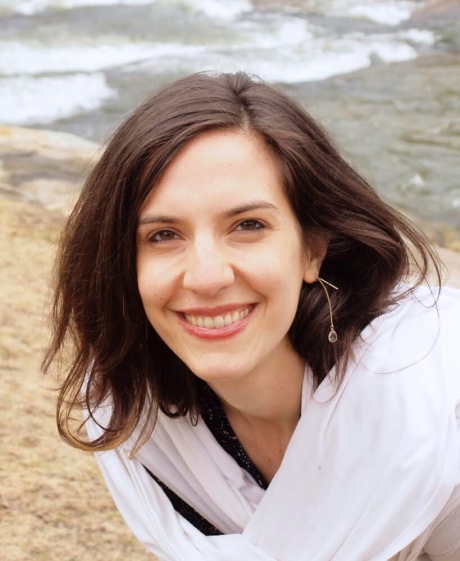
1) Who or what inspired you to become a composer?
While practicing certain piano pieces as a young child (I began learning to play at age four), I remember feeling as though something was lifting-melting-unfolding-leaping inside of me. Music gave me access to a rich inner world and all I wanted to do was spend more and more time adventuring inside of the space. I guess you could say Life-force inspired me to create and invent. I’m lucky that exterior opportunities and resources allowed me to continue to spend time where I felt most alive.
2) Who haven’t you worked with that you would like to?
I would like to connect with and collaborate with Krista Tippett and the folks at the podcast/movement OnBeing. That podcast has been such a gift to my life and I feel great resonance with Krista’s point of view: that the pursuit of wisdom and moral imagination is as important as the pursuit of knowledge. I can imagine creating improvised performance pieces with my ensemble (Constellation Chor) at their events, exploring theme through voice, something like that. Yuval Sharon is someone I’d like to work with. And I’ve worked with her in the past in a very surface way, but I’d love to work in a deep way with Meredith Monk.
3) Whats one experience that inspired your music for #1k1Day?
In this moment what suddenly comes to mind is my experience of being in the desert in Israel many years ago. I remember looking up at the stars and feeling like the sky was so close I could touch it. I felt intimate with the sky, like I knew it in a new way. I also felt the spaciousness all around me, like a wide open, horizontal parallel universe. When I seek spaciousness in the music I’m writing, I call upon that experience and ask it to inspire me. The Map (song in the show) has that space in it. So does the Finale.
4) This Genre-Bending score is so exciting- But what kind of music do you listen to and who are your influences for this piece specifically?
I truly cannot name or list any influences for this piece specifically because that’s not how I work as a composer. Rather, I’m made of all the music I’ve listened to and explored throughout my life, and what comes out of me when I write, comes from a subconscious place. Usually I notice that music I create reflects what I’ve digested a few years prior, rather than what I am listening to in the moment.
But here are some favorites on my playlists whose names have definitely made it into the conversations I’ve had with Music Director Kurt Crowley : Kate Bush, Tori Amos, Bjork, David Gray, Bon Iver, James Blake, Nine Inch Nails, Meredith Monk, Steve Reich and minimalism in general, Debussy, Rachmaninoff, Monteverdi…I also spent some months studying Hindustani singing in India when I was younger and that experience has certainly influenced this score.
5) How did you end up connecting with your Co-Creators?
Jason and I met in the Composer-Librettist Studio at New Dramatists in 2008! We enjoyed writing a song together so much, and he asked me if I’d be interested in turning his play 1001 into a musical. Erin and I met when she came to see TAMAR OF THE RIVER and we felt an immediate connection. We began exploring collaborative space, took a long hike and talked about our lives, and here we are! I met Kurt and Karla through Erin, and thanks goodness. They are both miracles.
6) With this show did you start with lyrics or music first?
Jason’s play came first. And the process has been really fluid. Sometimes I’d sit in a room and bring him 4 bars of something, or an idea for a leitmotif, and other times he’d bring me lyrics. My favorite times were when we lived in the same city and could be in different rooms writing the same song, checking in every twenty minutes to update the other on our work.
7) This story is so relevant and topical – what is one thing you want your audiences to take away from this experience?
I hope everyone feels moved to examine their own points of view and assumptions about others and about the world. The narratives we create about others define how we view them. When our narratives demean their humanity and limit their possibility for growth, that is never helpful or productive. I mean this sincerely and no matter what your politics are or what your place is in this world. I mean this for myself too. May I always be called to question my assumptions about others, again and again forever. May I always be open to changing my mind and may I allow others to change their minds. May I not pretend I know another human being until I know them. Knowing is a process.
8) Is there a character in the show you relate to most?
In my last musical Tamar of the River, I was 100 percent connected to Tamar’s emotional journey and motivations. I remember watching that piece sometimes felt like watching my own inner journey. But working on this musical is totally different: I don’t relate to any of the characters in the same way as I did with Tamar. But I believe we humans contain multitudes within us. It’s natural that we form our identity and feel separate from others, but we aren’t actually separate. And with this musical, I’ve gotten to know sides of myself I wasn’t previously in touch with. Parts of me relate to parts of each character who sings. But…Scheherazade is who I’d aspire to be. Such bravery and clarity of purpose.
9) The company of this production seems to be really close knit! Did you collaborate with the performers as a part of your process?
Yes! Chad Goodridge has been part of this piece since the very beginning!! He’s been part of every single iteration and knows this piece intimately. He’s also part of Constellation Chor (my ensemble mentioned above) so he and I collaborate together every week. Jen is also a member of the ensemble and a regular collaborator of mine. And Sepi and Ben have been part of two readings previously. The entire company is so so so special. I am in awe of each person on our team, and my awe is renewed daily.
10) What is coming up next for you? and what do you hope for the future of this piece?
What?? Nothing exists in my heart except ONE THOUSAND NIGHTS AND ONE DAY!!! 🙂 Okay, but in June, NAAMAH’S ARK, my oratorio for five choirs/200 singers, will be performed in Rockefeller Park starring Victoria Clark as Naamah, and conducted by Ted Sperling. Royce Vavrek wrote the libretto.
LIGHTNING ROUND!
Let’s get down to it!
1) What was your favorite album in high school? Little Earthquakes – Tori Amos
2) Where is your favorite place you have traveled? Israel, India, Iceland.
3) Dogs or cats? Dogs forever.
4) Favorite smell? Sweetgrass
5) Train, walk, bike or uber? Bike!
6) What book are you reading right… NOW! Malcolm Gladwell’s The Outliers
7) If you could have a super power what would it be? Endless patience, unwavering (yet discerning) trust.
8) Favorite way to spend a day off? In Nature somewhere, phone far far away or broken, journaling, reading and receiving inspiration from Life.
9) Met or MoMA? Planetarium!!!!
10) Finally! We made it! — What is the best advice you have ever received?
You can’t control things. Life is about putting in effort and letting go of attachment to outcome. Incidentally, this concept is what every single piece of music I’ve ever written is engaging with. Because I need to learn this lesson until it lives in all my bones.
*****************************************
MARISA MICHELSON is a multi-award winning writer of interdisciplinary music-theatre, choral work, and musicals, and is the founder of Constellation Chor, a vocal performance ensemble whose “sonic expressions, from ethereal sounds to primal screams, animalistic wails and simply breath” have been likened to “vocal innovators like Kate Bush, Bjork, Florence Welch and even Yoko Ono.” (StageBiz). Marisa is also a sought-after voice teacher. Her music has been called “exquisite” (NYTimes), “otherworldly” (Steven Suskin), and “gorgeous…adventurous” (Vox Magazine). Her musical with Joshua H. Cohen, Tamar of the River (Prospect Theater Company, 2 Drama Desk Nominations) was highly praised as “one of the most extraordinary scores in years (Jesse Green – NYMagazine). Marisa’s oratorio for 200 singers, Naamah’s Ark (with Pulitzer Prize winner Royce Vavrek, starring Victoria Clark) headlines the River to River Festival in June 2018. As a performer, Marisa’s presence has been described as “commanding as a goddess yet vulnerable as a maiden.” (StageBiz) Awards: 2017 Creative Engagement Award (LMCC); Jonathan Larson Award. Residencies: MacDowell, Ucross, Blue Mountain Center, New Dramatists. www.marisamichelson.comwww.constellationchor.com
TAKE A TEN with GABBY PEREZ!
March 25, 2018
One Thousand Nights and One Day Actor, GABBY PEREZ, answers 5 big questions and 5 little ones while on break!

TAKE A TEN!
1) Who or what inspired you to become a performer or enter into Theatre Arts?
I never had that one moment as a child that crystallized for me, “I want to be an actor!”. I had plenty of incredible mentors and teachers, but none that inspired me to pursue this as a career. For me, it was always a given. Theater was — and is — the source of the greatest joy I’ve ever felt. As a child, dancing around the house, writing my own songs, and putting on shows was a daily occurrence. It was just so fun. It made me so, so happy. And that simply didn’t change; in fact, that joy solidified into purpose once I got older and began taking class. I realized that there was a technique to creation and performance, and that I could pursue it for my entire life. Not only was that worthwhile, it’s the most fun I’ve ever had.
2) Why is Theatre important to you?
I honestly believe it can change lives. Obviously, it has changed my life in that it has given it purpose and passion. Theatre creates community and a sense of belonging. It brings actors, creatives, and crews together into a temporary family, and then we extend that sense of community to our audience. We go on a journey together in performance that only happens in real time; for the time that we are all in a theater space together (performing or witnessing), we are sharing a singular human experience that cannot be replicated ever again. It feels almost magical because it’s so important and fleeting and ephemeral. I can remember shows that I saw over ten years ago; it only lasted a few hours, but left a huge impact on me. Second, theatre can change minds. I love a funny musical with show tunes you can hum on your way home, but the most important work is the show that makes you question things you thought you knew, or plops some great truth about the human experience into your lap.
3) This show is so relevant to current events- what do you hope audiences take away from it?
This one will make you think. It will make you uncomfortable and then make you laugh out loud. I hope audiences can see themselves in our show, regardless of their background. I hope they can take a step back and look at themselves, what they think they know and assume. We all learn things, be it in a school classroom, from parents, or from what we see on the evening news. This show is inviting the audience to not only identify what they have been taught, where they learned those lessons (and question whether they were even aware that they were being taught them), but also to assess if those lessons are really “right”. The assumptions and black-and-white answers from individual minds accumulate to our society’s collective narrative, and that holds real power.
4) Who would you most like to work with?
I don’t know that I have a concrete list of names. Obviously, I admire many well-known theater artists, but I really just want to be in a room with kind people who are interested in making honest, pure art. I have absolutely found that in the cast and creative team for this show, “One Thousand Nights and One Day”. It is so important to me that everyone is open, generous, and trusts each other, and above all, that we all deeply care about the piece we’re creating. Love of discovery and play (without judgement) creates a sacred environment in which one can try anything, laugh a lot, and be vulnerable — all in service of the text we’re performing.
5) What is coming up next for you?
This summer, I’ll be heading to Arkansas Shakespeare Theatre to perform as Eliza Doolittle in “My Fair Lady” and Lady Percy in “Henry IV”. After that, I’ll be heading to the Newport Music Festival in Rhode Island for a “West Side Story” concert series celebrating Leonard Bernstein. And hopefully a vacation!
— 5 till places!—
6) Favorite album in high school?
I’m an old soul: I grew up listening to Bob Dylan, Santana, Aretha Franklin, and B. B. King. In high school, I was probably listening to some latin or blues album that dropped decades before I was born.
7) Cats or Dogs?
Cats.
8) What are you reading?
I usually read historical fiction, but right now I’m reading “The Power of Habit”. It’s an examination of how the routines we unknowingly fall into shape our lives, and what it would take to recognize those habits and alter them for the better. It’s a bit scientific and clinical, but I find that it absolutely applies to my work as an artist.
9) Best way to spend your day off?
I am a huge proponent of self care. For me, that’s staying in my apartment or neighborhood, being with my favorite people, eating healthy food, sleeping in, yoga, getting a massage, reading, taking a bath. It’s different for every person, but finding those few things that help you to reset your brain and body to gear up for the coming week of rehearsals is key.
10) What is the best advice you have ever been given?
The following is a quote that I re-visit very often as an artist. It is my reminder that even if I have a bad audition, a bad rehearsal, a low point of self-esteem, what matters is that we artists spend our lives discovering and bathing in the inarticulable truths of what it means to be a human being. To me, that is a very noble cause.
“It is not the critic who counts; not the man who points out how the strong man stumbles, or where the doer of deeds could have done them better.
The credit belongs to the man who is actually in the arena,
whose face is marred by dust and sweat and blood;
who strives valiantly; who errs, who comes short again and again, because there is no effort without error and shortcoming;
but who does actually strive to do the deeds; who knows great enthusiasms, the great devotions;
who spends himself in a worthy cause;
who at the best knows in the end the triumph of high achievement,
and who at the worst, if he fails, at least fails while daring greatly, so that his place shall never be with those cold and timid souls who neither know victory nor defeat.”
— Theodore Roosevelt
Thank you ten!!!
Gabby Pérez (Virgin Bride, Others) is an actor who sings, dances, and choreographs. She enjoys noodling on her ukulele and doing crossword puzzles. NY credits: ART/NY, Radio City, Joe’s Pub, Fringe Festival. National tour: Anything Goes. Regional credits include: Nina Rosario ( In the Heights ), Marian Paroo ( Music Man ), Portia ( Julius Caesar ), Anita ( West Side Story ). She is a big fan of rehearsals that thrill, challenge, and shock her; thank you to this visionary team for the joyous exploration.
About the show:
In mythic Persia, a daring young woman spins tales to save the kingdom and her life. In modern-day New York, a Jewish man and Palestinian woman fight to find love in a fractured world. This world premiere musical, adapted from Jason Grote’s critically-acclaimed play 1001, reinvents “The Arabian Nights,” colliding the contemporary and the ancient. Through a genre-bending score, it questions past and present images of the Middle East, exploring the power of story in our everyday lives.
How can I see it??
Performances for One Thousand Nights and One Day are Tuesday at 7PM, Wednesday at 7PM, Thursday at 8PM, Friday at 8PM, Saturday at 2PM and 8PM (no matinee April 7), and Sunday at 2PM (April 8 there is an added 7PM Sunday show, April 15 the matinee is at 5PM). Single Tickets are $25 – $55, with special rates available to Prospect Members. Tickets can be purchased by visiting: http://www.ProspectTheater.org or calling 212-352-3101.
Musical Insight on the Hello Girls with Peter Mills
July 24, 2017
The Hello Girls of World War I have piqued the interest of Prospect’s resident writer, composer / lyricist Peter Mills, as inspiration for a new musical. Many thanks to the National Endowment of the Arts for granting Prospect Theater Company funds to commission and develop this new piece. The interview below features some of Mills’ ideas and background for his approach to the show.
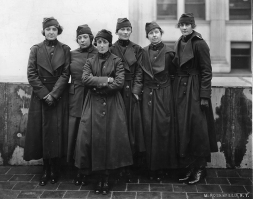
1. How did you find out about the story of the Hello Girls?
2. You’ve written several shows inspired by historical research. How do you approach the process? What are the challenges?
The process begins with the research, learning as much about the history, the people, and the circumstances as possible. In the case of THE HELLO GIRLS, some of that research has been into switchboards and telephone operator work — just trying to understand the work these women were doing — since it’s all a bit alien to us in the age of cell phones! After all of this fact-finding, then the real work begins, which is deciding what the particular story is that will be told. Who are the characters that we will follow? What is the arc of the plot? How will it be broken down into scenes?I think one of the major challenges in writing a show based on history is finding a story that is both dramatically satisfying but also reasonably faithful to the facts. It’s always a bit of a negotiation between those two priorities. When your characters are real people, you want to be respectful and accurate. But at the same time, you want to tell their story in a way that will be the most engaging for an audience — and history has a way of not always playing out in as dramaturgically pleasing a way as one might wish for the sake of storytelling. Still, it’s usually possible to tell a good story without having to play too fast and loose with the facts. It’s often a question of what you choose to focus on — the lens through which you view the material.
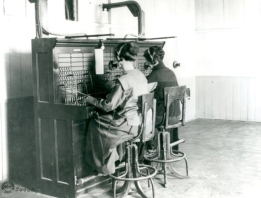
3. What do you imagine the music of this world sounds like?
Part of the research involves listening to period music, and also other musicals set in a similar time period, all with an ear toward finding the right sound world for the show. For instance, Sousa-style marches seem like an almost inevitable ingredient for a story of this time period, set in the world of the military. But also, a lot of the story takes place in France and the girls themselves were recruited in part for their French-speaking abilities, so it seems appropriate that there might be a French flavor to some songs, especially those informed by a sense of place. And then again, it is also a story about daring, pioneering women who were breaking down social barriers — and in that respect, there’s a bit of the spirit of the Jazz Age… which was just around the corner.
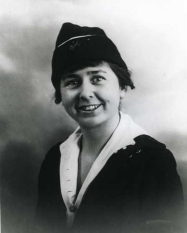
Grace Banker
4. Do you have a favorite character so far?
One of the great things about THE HELLO GIRLS is that there are six women at the center of the story, and they’re all fun characters. In some ways, I think this is an ensemble piece about a particular squad — who were sent to serve at the front during the pivotal Battle of the Argonne Forest. But if I had to pick a main character (and also a favorite character), it would be Grace Banker, who was the leader of that squad. Of course, I know Grace a little better than some of the others because she kept a diary about her war-time experiences — in defiance of Army regulations! That defiant streak is one of the things I love about her. Because it was also Grace who refused to abandon her post at the front when the building housing the telephone exchange caught fire… And then after her squad finally left the post (under threat of court-martial), it was Grace who led her operators back to the switchboards as soon as the fire had been put out, to continue connecting calls with those lines that hadn’t been destroyed in the fire. For this, she was given the Distinguished Service Medal after the war. In the years prior to World War 1, one of the arguments against women’s suffrage had been that women were not expected to risk their lives in service of the nation, as men were. So it could be argued that the role played by women like Grace during World War 1 was a strong contributing factor to the United States granting women the right to vote in 1920.
A Goodbye
July 14, 2017
Today, Prospect Theater Company is giving a warm farewell to our Management Intern and Global Musical Theater Initiative Associate, Julia Bardinon, as she returns to France after working with us for the past six months. We asked her some questions about her New York experience in the interview below:
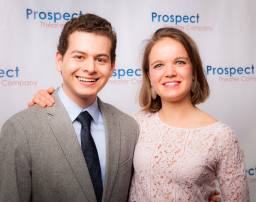
Julia Bardinon with Prospect’s Producing Associate, Brandon Zamudio, at the company’s 2017 Gala.
1. How was your overall experience in the New York theater world?
Usually when I get excited I switch to French. If I were to answer this question orally I would say: “absolument incroyable et très probablement la meilleure expérience professionnelle et personnelle que je pouvais espérer”. (translation: absolutely amazing and probably the best professional and personal experience I could dream of).
2. How is your time with Prospect Theater Company going to help you when you return home?
My experience here has inspired me to create a Musical Theater Lab in Paris, the first French Lab exclusively dedicated to Musical Theater. While working with Prospect Theater Company, you just get to think of everything you think of as being possible. And as a huge fan of Musical Theater, I want to help artists from my country develop new musical theater works while finding their own French way of gathering diverse performing arts on a stage. The Lab will have its first season next year and I’m so excited to try to adapt all the things I’ve seen and learned here to the French performing arts scene.
3. What has been your favorite part of your work experience?
Getting to meet the most inspiring and talented people I have seen in my whole life. Both on stage and off, Prospect Theater Company manages to gather a community of smart, hard-working AND passionate people. And the most amazing part was that even if I’m from a different country and so young in the industry, I now feel like a part of this very special community.
4. What was the one thing that surprised you most about your job AND New York?
Stage Managers. The position does not exist in France and honestly I was so surprised to find one in every single production. That was before I understood how valuable they were to the good conduct of rehearsals and shows. Later, I found out that stage managers are just the tip of the iceberg of the organization of theater in NYC. They are the living proof of how industrious and well organized theater is in this city.
5. What are you going to miss about your time here?
The excitement of discovering new things every single day – in the arts but also in general. Being an expat, it’s experiencing different habits, ways of seeing life, cultures… and it’s so enriching! and entertaining. And of course – I can’t tell how much I’m going to miss all the people I’ve met here…
The countdown ends as we meet the last of 9 writing teams in the 2017 Musical Theater Lab! Each team will be presenting a new mini-musical in culminating lab concert performance, World Views, on July 8th (link here for details!). These writers were selected through a competitive application process, and in these brief Q&As you’ll get some behind the scenes insight into their process and work. Our next profile is the writing team of Janet Allard and Niko Tsakalakos.
This year’s lab assignment was to create a musical inspired by a work of visual art found in an NYC museum.
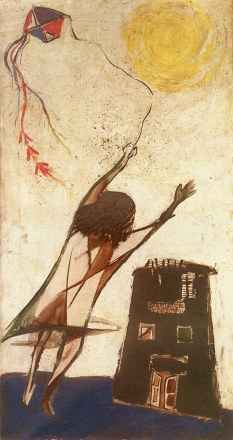
Artwork: The Kite by Gazbia Sirry
Title of your Mini-Musical: “Hello My Name Is Laura Buxton”
1. Were you familiar your with painting / artist prior to the lab process and if so what were your impressions?
[JA] No. But after I saw “The Kite” I ended up reading a lot about the artist and discovering her other paintings.
[NT] I had never seen the painting before. It was my favorite because somehow I connected with how the girl and the kite seemed to be moving together, as if she were being pulled up to the sky…
2. What drew you to the painting? Were your impulses more abstract, or did the image evoke any specific personal experiences or responses for your team?
[JA] The motion inherent in the painting. The color. The kite and the girl reaching. It called to mind a few things. The story of Icarus. The true story of a girl who released a balloon and as a result something sort of magical happened. The longing to reach for something beyond us.
[NT] For Janet, the image triggered an NPR podcast she heard about a girl named Laura Buxton who let a balloon go only to be found by another girl with the same name 140 miles south of where she lived. To me, I instantly recalled my own memory of letting a balloon go when i was a child and wondering how far it would fly, if it would touch the moon or dance with the clouds – an iconic sort of metaphor of the power of imagination or that universal need to connect to something bigger or extend beyond yourself. It was basis of the first poem I’d ever written. After studying the painting and watching the podcast, I knew we’d found a sweet spot where we could tell this incredibly fascinating story through song in a modern, relatable and concise way.
3. How was the lab writing process for your group? Was it different or similar to experiences you’ve had before?
[JA] Fast and furious. In a good way. We didn’t have a lot of time so we made choices fast and committed to them. Different in the 10 minute form. We hadn’t tackled that as a team before.
[NT] Positive energy all around, well organized and dedicated to making the piece work.
4. How does your piece in the lab relate to the rest of your body of work? Is it a new direction or collaboration, or a continuation / deepening of styles or themes you have explored previously?
[JA] Sort of a new direction. Our first female protagonist!
[NT] I think it is a deepening. It’s interesting how Janet and I threw out the first song we wrote for the piece as it was leading us down a different story telling path. We like to play and explore a lot before we hone in on what is really working. It’s also really interesting how we found this organic, inter-woven way to tell the story where there were ‘song propers’ as well as small themes that we used throughout to help tell the story. In a way, this is a bit new as we often try to go down a more song-based path where here it is a tapestry of some theatrical/dramatic statements inter-mixed with more pop oriented song material.
5. Which of the other lab musicals are you most curious to see and why?
[JA] “Trash Beach.” The title. And to see what craziness that image spawned.
[NT] All of them, can’t wait!
Janet Allard Musicals include: Into the Wild, Perseverance Theater (commission), Berkeley Rep Ground Floor (development), Rhinebeck Writer’s Retreat (development), Goodspeed Opera House (development), Encore Musical Theatre (workshop production), Rattlestick Playwright’s Theatre’s ‘New Songs Now’. Pool Boy at Barrington Stage, Provincetown Playhouse, Pittsburgh CLO, Driving West at Ars Nova, The Unknown: Jonathan Larson Award with P73 Productions, NYMF, Joe’s Pub. Her work has been seen at The Guthrie Lab, The Kennedy Center, Playwrights Horizons, The Yale Cabaret, The Women’s Project, Birdland, 54 Below. She is a Fulbright Fellow, has an M.F.A in Playwriting from Yale School of Drama, and has studied at the NYU Tisch Graduate Musical Theatre Writing Program. http://www.janetallard.com
Niko Tsakalakos’ new musical Into the Wild, written with Janet Allard and based on the book by Jon Krakauer, was recently given a developmental premiere at Encore Musical Theatre Company (Dexter, Michigan). Pool Boy, also written with Allard, enjoyed a sold-out run at Barrington Stage Company (2010) and was produced at NYU’s Provincetown Playhouse (2012). A cabaret version has recently been commissioned by Pittsburgh Civic Light Opera. Fall Springs, written with playwright Peter Sinn Nachtrieb, received a showcase at The York (2016) and has been workshopped at New Dramatists, Ars Nova, and TheatreWorks (Silicon Valley). More at: http://www.nikosongs.com
Our countdown is almost finished as we feature the eighth of 9 writing teams in the 2017 Musical Theater Lab! Each team will be presenting a new mini-musical in culminating lab concert performance, World Views, on July 8th (link here for details!). These writers were selected through a competitive application process, and in these brief Q&As you’ll get some behind the scenes insight into their process and work. Our next profile is the writing team of Christiana Cole and Rona Siddiqui.
This year’s lab assignment was to create a musical inspired by a work of visual art found in an NYC museum.
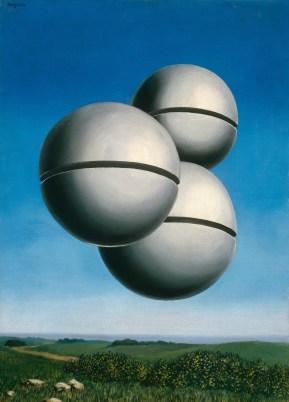
Artwork: Voice of Space by René Magritte
Title of your Mini-Musical: “Make the Earth Great”
The responses below were made by Christiana Cole on behalf of the team.
1. Were you familiar your with painting / artist prior to the lab process and if so what were your impressions?
I was familiar with Magritte, but not with this particular painting. I’ve always enjoyed surrealist art. I especially like Magritte because of his dry wit and his interesting mix of cartoonishness and coldness.
2. What drew you to the painting? Were your impulses more abstract, or did the image evoke any specific personal experiences or responses for your team?
Rona was first drawn to the painting. I forget how we came up with our story, but we both dig outer space, speculative fiction, and allegories, so it was born out of that.
3. How was the lab writing process for your group? Was it different or similar to experiences you’ve had before?
Rona and I both enjoy working quickly, in part because it forces you to cut everything that isn’t essential to the storytelling.
4. How does your piece in the lab relate to the rest of your body of work? Is it a new direction or collaboration, or a continuation / deepening of styles or themes you have explored previously?
For me (Christiana), I found that this story necessitated a more symbolic (and less literal) form. I wrote a complete draft and had already edited it when I went and saw Pacific Overtures at Classic Stage, and it motivated me to throw out everything and start over — in a great way. Pacific Overtures inspired me to cut the plodding “hows” and focus on the more-interesting “whys” of the story.
5. Which of the other lab musicals are you most curious to see and why?
I’m interested in seeing Emily Kaczmarek and Zoe Sarnak’s piece. I’ve sung some of Zoe’s music before and really enjoyed it! I’m also really excited for “Trash Beach” (we loved the image but couldn’t think of a story) and “The Door” (the Georgia O’Keeffe) (same deal).
The New York Times called Christiana Cole “top-notch.” Lyricist for musicals for young audiences, including Peanut Butter and Cupcake (based on the best-selling book), to be produced at Interlakes Theatre this summer. Her new adaptation of The Frog Prince will be produced at Random Farms Children’s Theatre in fall 2017, and is licensed to theatres in Japan, China, and Korea. Christiana is a champion storyteller, featured on NPR’s The Moth GRANDSLAM. Currently writing a musical about the life of Bella Abzug with Rona Siddiqui and Beth Blatt. Member: BMI Advanced Workshop. Christiana is an accomplished performer, and teaches voice lessons. http://www.christianacole.com
Rona Siddiqui is a composer/lyricist in NYC. (Musicals) One Good Day- ASCAP/Dreamworks Musical Theatre Workshop, 2014 Festival of New American Musicals’ Best New Musical. (Off-Broadway)The Tin,Treasure in NYC. (Regional Original Scores) Middletown, The Vagina Monologues, The Good Person of Szechuan, The Clean House, Love Song of J Robert Oppenheimer. (Web series) Amateur Dicks. (Awards) 2014 ASCAP Foundation Mary Rodgers/Lorenz Hart Award, 2011 ASCAP Foundation/Max Dreyfus Scholarship. Collaborations include The Civilians, NYC Gay Men’s Chorus, MuseMatch, 52nd St Project. Currently composing musical about Bella Abzug. Graduate of NYU’s Graduate Musical Theatre Writing Program. http://www.ronasiddiqui.com
We’re nearing the end of the countdown as we present the seventh of 9 writing teams in the 2017 Musical Theater Lab! Each team will be presenting a new mini-musical in culminating lab concert performance, World Views, on July 8th (link here for details!). These writers were selected through a competitive application process, and in these brief Q&As you’ll get some behind the scenes insight into their process and work. Our next profile is the writing team of Douglas Lyons, Ethan Pakchar and Melvin Tunstall III.
This year’s lab assignment was to create a musical inspired by a work of visual art found in an NYC museum.
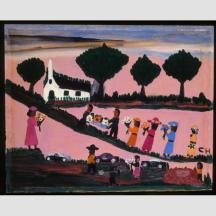
Artwork: Funeral by Clementine Hunter
Title of your Mini-Musical: “The Funeral.”
The responses below were made by Douglas Lyons on behalf of the team.
1. Were you familiar your with painting / artist prior to the lab process and if so what were your impressions?
No I wasn’t familiar with the artist or painting at all. I was blown away by the small details within the work and it became our job as the team to create backstory for every little nook and cranny of the painting.
2. What drew you to the painting? Were your impulses more abstract, or did the image evoke any specific personal experiences or responses for your team?
The four women of color drew us to the painting and the fact that one of the women had her bouquet of flowers turned upside down left some questions to be answered. The painting itself seems simple but there’s so many emotions at play during funerals, it felt like there was a juicy opportunity for us there.
3. How was the lab writing process for your group? Was it different or similar to experiences you’ve had before?
This specific process has been unique because for 3 weeks we were long distance leading right up to a deadline. We’ve all followed our instincts and fed off of one another and we’re pretty proud of what we found.
4. How does your piece in the lab relate to the rest of your body of work? Is it a new direction or collaboration, or a continuation / deepening of styles or themes you have explored previously?
Ethan and I have been working as a writing team for 4 years now, Melvin and I have two other writing babies together. This is the first time this combo of writers is working together but it all feels like family. This is the first time I’ve been able to write gospel for Theater and that’s pretty exciting. I grew up singing in church so this piece pays homage to my roots.
5. Which of the other lab musicals are you most curious to see and why?
I’m really excited to see “The Kite” because that was another painting that caught my attention during the selection process!
Douglas Lyons is a composer-lyricist and actor who’s originated roles on Broadway in The Book of Mormon and Beautiful. As a writer Douglas conceived Polkadots: The Cool Kids Musical which has upcoming productions at the Atlantic Theater Company, Children’s Theatre of Cincinnati and Orlando Rep. Upcoming world premieres: Five Points at Theater Latte Da and Peter, Darling at Casa Mañana Theatre. With composer Ethan Pakchar his lyrics have played Lincoln Center, The Old Globe, Seattle Rep and morE. Douglas is currently in residence at The Directors Company and under commission with Seattle’s 5th Avenue Theatre. @DouglasSings
Ethan Pakchar has played guitar for the Broadway productions of Hamilton, Wicked, Book of Mormon, Lion King and more. He serves as orchestrator on Polkadots: The Cool Kids Musical. Half of the songwriting team “Lyons & Pakchar” who have been heard at Lincoln Center’s Broadway Songbook Series, Joe’s Pub at The Public Theater, Goodspeed’s Johnny Mercer’s Writing Colony, The Old Globe, Seattle Rep, The Musical Theatre Factory and more. Commissions: Seattle’s 5th Ave Theatre (’64). He holds a B.M. from NYU.
Melvin Tunstall, III, composer, lyricist, librettist, began his career as a performer and has appeared in the Broadway and international companies of Beautiful: The Carole King Musical, Rock of Ages, and Ain’t Misbehavin’. A graduate of the Musical Theater Program at the Cincinnati Conservatory of Music, Melvin wrote the book to the TYA phenomenon Polkadots: the Cool Kids Musical, which will be the first TYA musical filmed for Playbill.com’s new HD streaming service. His musical Peter, Darling was commissioned by and will premiere at Casa Mañana Theater in Texas in the spring of 2018. Melvin resides in New York City where he is currently writing the book, music and lyrics for Higgins In Harlem: a new musical Pygmalion.
We are getting closer to the show as we introduce the sixth of 9 writing teams in the 2017 Musical Theater Lab! Each team will be presenting a new mini-musical in culminating lab concert performance, World Views, on July 8th (link here for details!). These writers were selected through a competitive application process, and in these brief Q&As you’ll get some behind the scenes insight into their process and work. Our next profile is the writing team of EllaRose Chary and Brandon James Gwinn.
This year’s lab assignment was to create a musical inspired by a work of visual art found in an NYC museum.
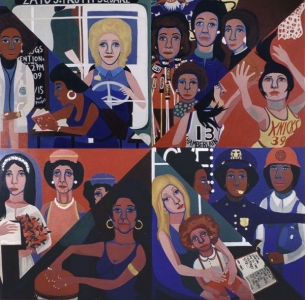
Artwork: For the Women’s House by Faith Ringgold
Title of your Mini-Musical: “Patchwork”
1. Were you familiar your with painting / artist prior to the lab process and if so what were your impressions?
We were not familiar with the painting or the artist before the process, but were very excited to learn about Faith Ringgold. She’s an amazing artist and activist and the piece “For The Women’s House” was commissioned to be put up in the Riker’s women’s prison. Ringgold primarily works in quilt making as a medium, so we were also interested in figuring out how to make a musical quilt and what that would look/sound like. As we learned more about her, we wanted to make sure we did justice to not only the piece of art but the impulse and artist behind it.
2. What drew you to the painting? Were your impulses more abstract, or did the image evoke any specific personal experiences or responses for your team?
We’re interested in telling stories that are inclusive and that reflect the world around us, particularly in New York City, rather than the version of the world that we often see in media/on stage in musical theater. We’re drawn to stories about women and community, which this evoked. We were interested in writing a piece that happened in an instant and centered around an event that stopped the flow of city around it, with all of the women watching and reacting in specific ways. We’re also cognizant of issues of gentrification and police violence in our community in Harlem, and wanted to write a piece that dealt with that and our roles in those issues. The painting and the story behind it just made sense with our mission as artists and the kinds of stories we want to tell.
3. How was the lab writing process for your group? Was it different or similar to experiences you’ve had before?
It actually took us back to our grad school days at Graduate Musical Theater Writing at NYU – being given an assignment and a limited time to write in and just figuring it out. It was a bit hectic (especially because we’re working on some other projects simultaneously) but it was also exciting to just have to make fast choices and follow our impulses.
4. How does your piece in the lab relate to the rest of your body of work? Is it a new direction or collaboration, or a continuation / deepening of styles or themes you have explored previously?
The themes are definitely in line with the types of characters we feature and the stories we tell – but stylistically this a totally new direction for us. More classically influenced than some of our other shows, and through sung – which was an exciting challenge for us and the actors!
5. Which of the other lab musicals are you most curious to see and why?
Oh, this is a terrible question! Of course we’re excited to see all of them because a lot of the writers we know and like their work (or know them but not their work and are psyched to see what they do) and then the folks we don’t know as well, we love being introduced to new writers and their work. We’re too egalitarian and community-minded to single anyone out, obviously…:-)
EllaRose Chary is an award-winning writer focused on politically engaged projects. Prospect: The Daguerreotype, By The Numbers. Current projects: Cotton Candy and Cocaine (Ars Nova Uncharted), Queer. People. Time. (Dramatists Guild Fellowship), Patriettes (The Tank’s TV Writing Program, the #Fword Finalist), Untitled Anarchist Play (The Civilians’ R & D Group), The Lake and the Mill (Drama League Rough Draft Residency) and several commissions for young audiences. BA: Brown University; MFA: NYU Tisch http://www.ellarosechary.com
Brandon James Gwinn is an award-winning composer, lyricist and musician. His musicals include Cotton Candy & Cocaine (Ars Nova Uncharted) Queer. People. Time. (Dramatist Guild Fellowship), Matchmaker Matchmaker, I’m Willing to Settle (ART Club Oberon, New York Musical Theatre Festival 2011), Small Town Story (Finalist Richard Rodgers Award, NAMT Writer’s ResidenCy Grant, Village Originals Seattle, NYTB Commission). He recently produced the debut album of Trixie Mattel (RuPaul’s Drag Race) which premiered at #2 on the iTunes charts. MFA: NYU Tisch.